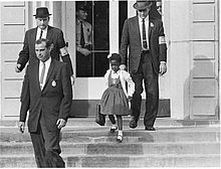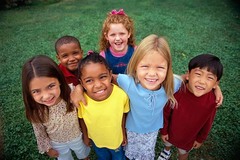"The Mighty One has done great things"

In January, we celebrate Martin Luther King day. We remember the civil rights movement, and the work that continues today. One thing we sometimes forget, though, is the integral role that Christian faith played in the motivation and work of the civil rights movement. Justice was not divorced from faith; but rather driven by the life and teachings of Jesus. We celebrate MLK day when the birth of Jesus is fresh in our memories, and it is interesting to look back at Mary’s words when Jesus was in her womb. Echoing her ancestor Hannah’s words at the birth of Samuel (I Sam 2), Mary proclaims God as the mighty one who has done great things - then goes on to describe social justice. MLK Day is not just something to let our children learn about in school, but rather an opportunity to help our children see the love of Jesus in action. It is a chance to help them take their place in this long story of God’s love being lived out on earth.
Read It

Luke 1:46-55
And Mary said,
“My soul magnifies the Lord,
and my spirit rejoices in God my Savior,
for he has looked with favor on the lowliness of his servant.
Surely, from now on all generations will call me blessed;
for the Mighty One has done great things for me,
and holy is his name.
His mercy is for those who fear him
from generation to generation.
He has shown strength with his arm;
he has scattered the proud in the thoughts of their hearts.
He has brought down the powerful from their thrones,
and lifted up the lowly;
he has filled the hungry with good things,
and sent the rich away empty.
He has helped his servant Israel,
in remembrance of his mercy,
according to the promise he made to our ancestors,
to Abraham and to his descendants forever.”
And Mary said,
“My soul magnifies the Lord,
and my spirit rejoices in God my Savior,
for he has looked with favor on the lowliness of his servant.
Surely, from now on all generations will call me blessed;
for the Mighty One has done great things for me,
and holy is his name.
His mercy is for those who fear him
from generation to generation.
He has shown strength with his arm;
he has scattered the proud in the thoughts of their hearts.
He has brought down the powerful from their thrones,
and lifted up the lowly;
he has filled the hungry with good things,
and sent the rich away empty.
He has helped his servant Israel,
in remembrance of his mercy,
according to the promise he made to our ancestors,
to Abraham and to his descendants forever.”
Do It
Learn about the Civil Rights Movement: As a family, read or watch this book about Ruby Bridges. Ruby, at the age of 6, was among the group of children who led the way in desegregating public schools. She prayed each day as she walked into school. Her faith not only gave her courage to walk through mobs of people yelling hate, but also helped her to look at them without hate. As a child herself, Ruby is a good entry to civil rights for children. Her story continues, so if you have older children, consider looking her up and watching more recent interviews with her.
Take Action:
This month’s scripture says that God lifts up the lowly and fills the hungry with good things. God does this work through us, the people of God. How can your family join in this work? What are the needs around you that you can help meet? Where is the injustice in your town, and how can you respond to it? Here are some ideas:
Ages 0-3:
You can simply help your child to see everyone as a child of God, created in God’s image. This happens through the behavior and language that you model. Seek friends who look different from you and have different backgrounds. Think carefully about the pictures on your walls and the books you read - do they represent all God’s children, or do they reinforce only your family’s skin color and economic status? What about the dolls your child plays with?
Ages 4-6:
Go grocery shopping together, then deliver the food to a food bank. Ask who the lowly are in your community, and consider how you can lift them up. Start having conversations with your children. Help them learn empathy when they describe the behavior of other children school - what might be some life situations that make their friends behave the way they do?
Ages 7 and up:
Do all of the things described for younger children, and then consider letting your children be activists for the things they care about. Do they care about learning from other cultures? Let that be the theme of their birthday party. Do they care about God’s creation? Let them pick up trash or help with tree planting on your city’s Arbor Day. Do they care about the poor? Let them serve at a local soup kitchen, ring Salvation Army bells at Christmas, or simply make friends with people who don’t have enough. Do they care about social and racial justice? Let them write letters to people in positions of power. Depending on your situation and opportunities, you may even go as a family to a march or protest. And with all of this, educate. Learn more about these issues that speak to your child’s heart. The civil rights movement, particularly the part of it led by MLK, was based on peacefully opening the eyes of the world to all that was not equal, all that was not as God intended. In your corner of the world, your family can join the work that is yet to be done.
Take Action:
This month’s scripture says that God lifts up the lowly and fills the hungry with good things. God does this work through us, the people of God. How can your family join in this work? What are the needs around you that you can help meet? Where is the injustice in your town, and how can you respond to it? Here are some ideas:
Ages 0-3:
You can simply help your child to see everyone as a child of God, created in God’s image. This happens through the behavior and language that you model. Seek friends who look different from you and have different backgrounds. Think carefully about the pictures on your walls and the books you read - do they represent all God’s children, or do they reinforce only your family’s skin color and economic status? What about the dolls your child plays with?
Ages 4-6:
Go grocery shopping together, then deliver the food to a food bank. Ask who the lowly are in your community, and consider how you can lift them up. Start having conversations with your children. Help them learn empathy when they describe the behavior of other children school - what might be some life situations that make their friends behave the way they do?
Ages 7 and up:
Do all of the things described for younger children, and then consider letting your children be activists for the things they care about. Do they care about learning from other cultures? Let that be the theme of their birthday party. Do they care about God’s creation? Let them pick up trash or help with tree planting on your city’s Arbor Day. Do they care about the poor? Let them serve at a local soup kitchen, ring Salvation Army bells at Christmas, or simply make friends with people who don’t have enough. Do they care about social and racial justice? Let them write letters to people in positions of power. Depending on your situation and opportunities, you may even go as a family to a march or protest. And with all of this, educate. Learn more about these issues that speak to your child’s heart. The civil rights movement, particularly the part of it led by MLK, was based on peacefully opening the eyes of the world to all that was not equal, all that was not as God intended. In your corner of the world, your family can join the work that is yet to be done.
Pray It
God, we know that you created each human being, and you created each one good. That includes us and every person we see. Help us to see others with your eyes. Show us how we can join your work of love and justice. In Jesus’ name, Amen.
Explore It
A helpful article from Edutopia with tips for teaching children these concepts.
Ideas from Sacraparental for helping kids practice social justice.
Ideas from Sacraparental for helping kids practice social justice.
